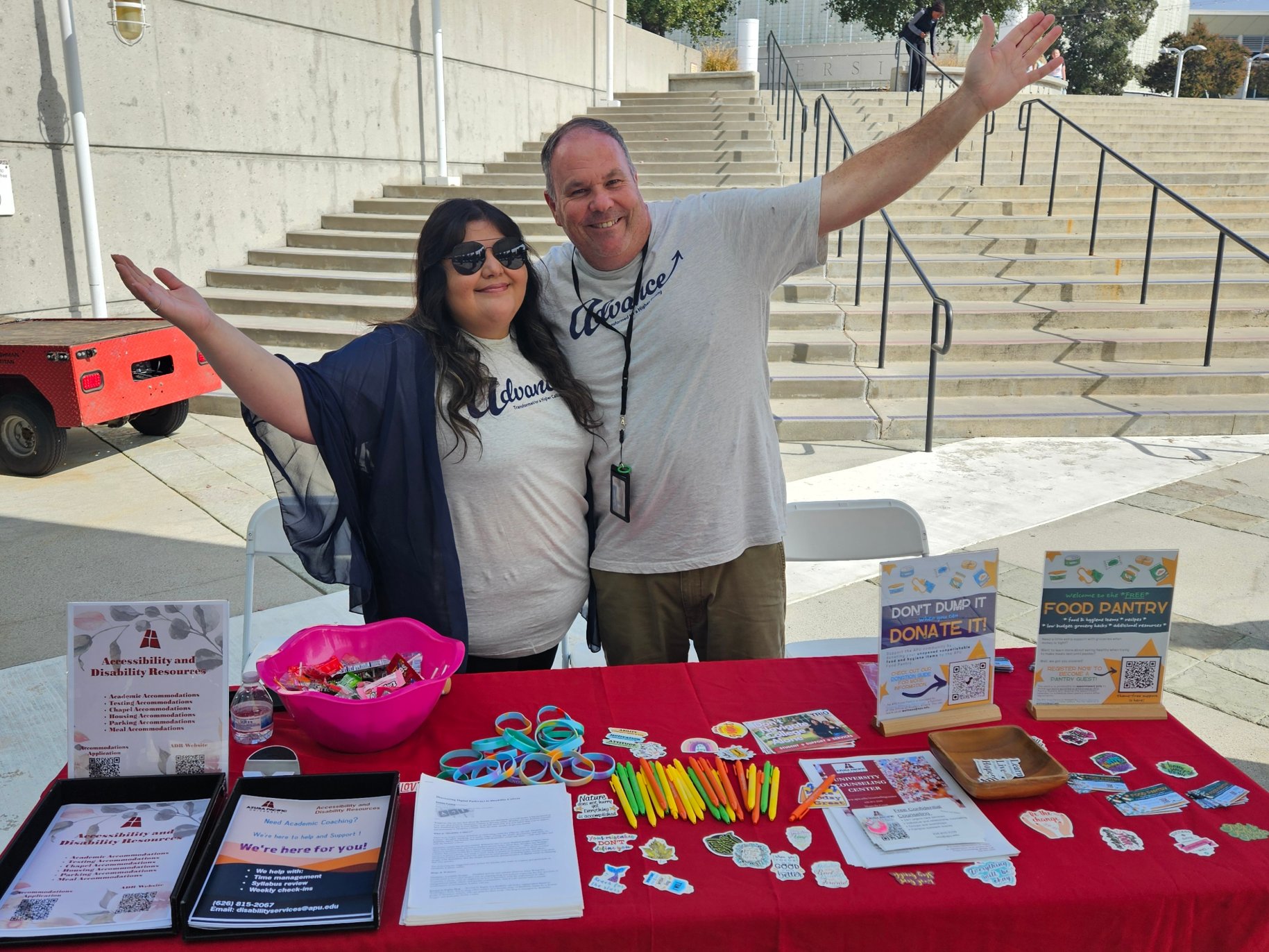- Home
- >
- APU Articles
- >
- News Article
Student Resources: APU Office of Accessibility and Disability Resources Supports All Students
November 25, 2025 | Written By Jacqueline Guerrero

As we wrap up our series on some of the best resources for students at Azusa Pacific University, it’s important to highlight the Office of Accessibility and Disability Resources (ADR). Undergraduate, graduate, and professional students from any of APU’s campuses can connect with the ADR for long or short term accommodations regarding physical, emotional, or academic challenges.
ADR’s three step process makes applying for accommodations easy and accessible. To begin the process, students can fill out the application on their website. For help with the application, the ADR staff are willing to walk students through the process over the phone or in person. Students meet with the ADR staff for an intake meeting for an assessment of the impact of their disability in the academic, social, emotional, and psychological aspects of their life. “Some students know what support they need, especially if they have received prior support plan such as a 504 plan or an IEP in school, but others don’t know what to ask for or what resources are available to them,” said Salpi Kerkyasharian ’99, ADR director. “Even if there is no official diagnosis, we can refer students to the right resources for them on and off campus.” Once a student is approved, the ADR will walk them through any available resources.
Some of the most common accommodation requests are for students with physical disabilities, learning differences, mental health concerns, hearing and visual impairment, chronic medical conditions, and temporary injuries. Temporary injury accommodations are especially useful for athletes. The ADR also has resources for students who are going through loss or grief that impacts their academics. Many students connect with the ADR office for academic resources for note-taking, using assistive technology in class, testing, studying, and more. A unique resource the office offers is academic coaching. Students meet with a graduate student once a week to learn about and improve study skills, time management, and test taking strategies. “We let students take the lead when it comes to how much and what kind of support they want,” said Leticia Reeves, accommodations specialist. “Some students even ask to start their academic coaching or meetings with a prayer which we’re happy to do and is another unique aspect of our role on a Christian campus. It’s been a gift to be able to spiritually support students while also helping them find resources to succeed academically.” Another common resource the ADR provides students with access to is the Testing Center. Students with testing accommodations can use the center as a distraction free space to take tests, often for an extended period of time, that is free of distractions. Academic accommodations can also be made available to students in the classroom ranging from assistive technology and software to readers and scribes.
Karissa Garcia ’27 is a psychology major whose accommodation allows her to record and make a transcript of class lectures
using Google Gemini, take extra time on tests, and take tests in another room. “APU’s
services are unlike any I’ve ever seen,” she said. “The only thing I got in high school
was extra time on tests, but coming here and seeing how much they offer and support
students blew my mind. They’ve been so incredibly helpful.” Garcia appreciates Kerkyasharian and Reeves’ friendly and inviting natures. She shared that her experience
with the ADR has been extremely positive.
Reeves and Kerkyasharian prioritize cultivating a positive environment and experience for students. “We’ve worked hard to eliminate the stigma around advocating for yourself by seeking out accommodations,” Kerkyasharian said. “Besides providing resources and support to students, we want to help students focus on their God-given strengths and bring awareness to the value of how people’s differences enhance His kingdom while we’re in this world.” Part of cultivating a positive environment is building strong inter-departmental relationships to make sure that students are supported by a team of people who can help in a variety of ways. The ADR is actively working with different departments on campus to see how they can further work to support students. “Working with other departments has reaffirmed for Salpi and myself that our office is dedicated to supporting students no matter what their disability may be,” Reeves said.
As a Christian university, APU emphasizes the importance of community, and while the ADR is completely confidential, students have the option to have a team of supportive faculty and staff behind them. When a student receives an accommodation that affects their classes, professors are notified of the accommodation but not of the reason for it. “We welcome staff and faculty to reach out to us to learn how they can best support their students,” Reeves said. “We’ve had professors visit us with their students to learn more about our resources, and some professors ask us to present about our resources in their classes.”
The ADR also encourages prospective students to reach out to their office to see what accommodations may be available to them as they begin the college application process or after they have committed to APU. High school students and their parents often reach out to the office or stop by on their tours to learn more about the resources and support options. The ADR also hosts weekly sessions, panels, and workshops over the summer for incoming students. Looking at the resources available at a university can help students decide if a school is the right fit for them, and students who start the accommodation process earlier may be able to start using their resources as soon as the semester begins.
Reeves and Kerkyasharian encourage any student who is looking for physical, academic, or emotional support on campus to reach out to the ADR by email: [email protected], phone: (626) 815-2067, or stopping by in person: building 24 on East Campus.